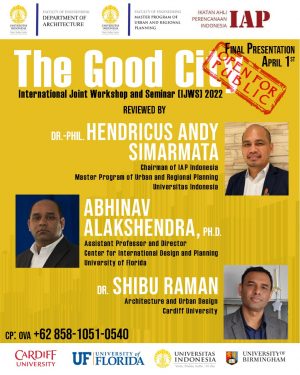Here we are at the Closing IJWS 2022 and its time to hear the group presentations!
Please join us for the final presentation on:
Friday, April 1, 2022, started from 07.30 PM Jakarta Time.
There are four groups presentation that explore specific themes that challenging the Good City, including:
1. Preservation and Innovation in the Built Environment for the good city – with facilitator: Prof. Kemas Ridwan Kurniawan (UI) and Dr. Kyle Dost (UF)
The built environment in cities is subject to constant change as existing resources age, sometime change function and potentially get removed, while there ware continuous additions of new built environment assets that change the look and even the function of urban spaces. Preservation and innovation in the built environment are essential to the dynamics of urbanization but what is the best sort of balance between these two characteristics to create the good city? Are there principles upon which the good city’s built environment is shaped, and how are these reflected in the case study places either through positive symbiosis between preservation and innovation, or incongruities that need to be addressed through some interventions. How are these two aspects of the built environment regarded in the two cases study of Depok and Gainnesville and do they contribute to the good city.
2. Green and Healthy Environment for the good city – with Facilitator: Dr. Ova Candra Dewi (UI) and Prof. Andrew Flynn (CU)
What would be the changes to the world after COVID-19? Is the healthy environment will speak louder rather than the green one? What is healthy environment in the perspective of a good city? Is healthy environment should always be bound together with green environment? The cities nowadays are pushed to compete with globalization and urban agglomeration. How far the city will be a good city? Moreover, to keep the city green and healthy for the inhabitants. What are the variables to measure the green and healthy environment in a good city? Is it the number of green buildings, number of green behavior codes, revitalization of urban green space? Or else?
3. Circular Economy for the good city – with Facilitator: Prof. Andrew Flynn (CU) and Dr. Andrew Ivins (CU)
Cities around the world are grappling with the challenge of how to sustainably manage the waste that their citizens and businesses produce. More sustainable waste management is integral to ideas of the Good City. The Circular Economy is one of the most innovative and wide-appealing efforts to resolve these waste management challenges. The Circular Economy highlights the need to go beyond efforts to recycle and reuse to keep those materials in productive use. This in turn, it is hoped, will encourage new forms of economic activity. There are different models of the Circular Economy emerging, including those that are market-led and seek to encourage trade in materials; those that are underpinned by government regulatory efforts; and those that seek to promote community self-sufficiency in materials use. The latter are some of the most interesting ideas because they bring to the fore relations between producers and consumers and the different sets of responsibilities that they may have in supporting a Circular Economy. As well as understanding local waste management infrastructure and facilities, we need to know more about citizens perceptions of the reuse and recycling of materials. For example, do we have worries about the security of data and store old mobile phones at home or do we make sure that our old phones are dismantled, and the materials re-used? What information do smart phone suppliers provide on the end of life of their products? Answering questions such as these will be central to hopes to steer businesses and citizens towards a Circular Economy.
4. Climate Change, mitigation, adaptation for the good city – with Facilitator: Dr. Miktha Farid Alkadri and Dr. Andrea Frank (BU)
When considering the perennial question of that makes a “good” city there are many principles that are cited frequently. Considering this from the lens of climate change and its impact on urban areas will likely guide thinking and actions in the direction of creating redundancies in energy and water resource provision, creating environments that remain safe, functioning and liveable even when enduring extreme weather events such as droughts, storms and so forth. One might argue that a good city will provide a pleasant, healthy and resilient environment for all its citizens and visitors in equal parts rather than having socio-economically weaker segments being exposed more to the negative impacts of the globe’s changing climate. As climate change has different patterns across the planet, recommendations will need to be customized to case study places – although there may be generalizable aspects as well.
The above presentations will be followed by review from our invited reviewers, including:
– Dr. -Phil. Hendricus Andy Simarmata (The President of Indonesian Planner Association/IAP and Lecturer of Master Program of Urban and Regional Planning Engineering Faculty Universitas Indonesia/PWK FTUI)
– Abhinav Alakshendra, Ph.D. (Assistant Professor and Director Center for International Design and Planning University of Florida)
– Dr. Shibu Raman (Architecture and Urban Design Lecturer, Cardiff University)
For those of you who want to join, don’t hesitate! It is open to the public! So, don’t miss joining us at the Closing IJWS 2022 because there will be lots of insight to take home!
Click the zoom link below:
https://us02web.zoom.us/j/88618648779?pwd=NVBVWEVLeFFPNjB2UGpXSGRqQit6QT09












